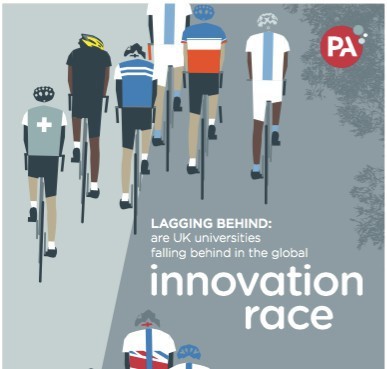Who’s losing the innovation race? We are.

I do like the annual survey by PA Consulting of university leaders’ views of the world. This latest one, the seventh such, is called The Innovation Race, and focuses on vice-chancellors’ thoughts on innovation, or more precisely the lack of it, in Britain’s universities. The report also shows how views have changed over time, particularly in relation to university closures and mergers, sets out the response of the UK sector to wider global higher education innovations:
University leaders acknowledge the importance of emerging global innovations in educational programmes, modes of study and learners’ experiences that are reshaping 21st century higher education.
However, they believe the UK system is lagging behind international leaders in every major area of innovation and express concerns about the responsiveness of their own institutions to these developments.
These findings have significant implications for the future competitiveness and even the survival of UK providers.
According to the report university leaders think there are lots of reasons why innovation is so slow in UK universities including:
- rigid structures and processes
- resistance to change
- the fragmented nature of previous change initiatives
- the absence of real incentives and the absence of a burning platform
- more confidence that there won’t be institutional failures and enforced mergers
- an inherently conservative culture and aversion to risk, especially from governing bodies.
Of course many within universities are equally concerned that there is already too much innovation and change thank you very much.
The authors identify seven particular areas of innovation from the comments made by respondents and it is interesting that university leaders are somewhat pessimistic about UK’s positioning. Three out of the seven innovations are mainly seen as taking place overseas. In four cases there ate believed to be many good examples in the UK but in none does this country lead the world.

One of the areas of innovation I found particularly interesting given all of the talk about it in the past year is education analytics:
Over two-thirds said they have made little or no progress towards adopting student analytics and saw little happening in this area across the UK sector, even though several vice-chancellors commented this was potentially a key development for the whole sector, enabling personalised learner journeys.
This is an area where the US has been leading the way but it does seem that the UK is a very long way behind. Perhaps it is something more fundamental about the underlying systems and technology in many universities which is the problem here. VCs are still pretty keen though:

It does seem though that a major reason for the lack of change is that there seems to be no big incentive, no burning platforms to prompt such change. However, this does rather contradict the other view expressed by leaders that major change is essential for future success:
Nonetheless, given the spate of recent cases where vice-chancellors have paid a heavy price for pushing changes further and faster than their institutions and governing bodies were willing to follow, it is perhaps understandable
Two other striking issues in the report that are of note. First, there is much less pessimism about the future of the sector than in previous years with a clear majority expecting fewer than five university failures in the next 5-10 years. And secondly, there is a generral view that, overall things will look pretty much like they are now. Major shifts to work based learning or online learning for example are seen as unlikely by most respondents.
So basically not a lot is going to change because the circumstances militate against it and, ultimately, it’s not that necessary anyway.
The sense of disappointment in the report’s conclusions is palpable. But it’s an interesting and stimulating report and well worth a read.













Reminds me of 2013: http://followersoftheapocalyp.se/sailing/
It’s almost like you got there two years earlier.
I’m torn on this, between the conservative – ‘what we have is fine, we’re well regarded, let’s just do what we do, as well as we can … sticking to the core business is good’ and the inherent complacency in this approach. ‘More of the same’ just does not feel right, to me.